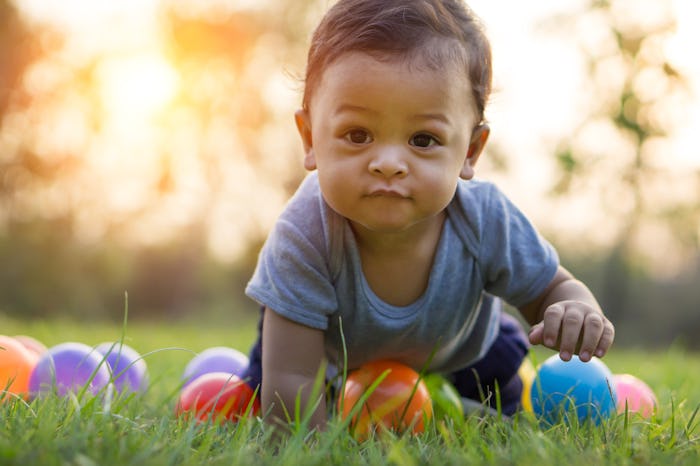When I was pregnant with my first child, I constantly read baby books to ensure I was primed for motherhood. At one of my check-ups, a nurse saw me reading and chuckled. "You're wasting your time," she said. "Babies don't read those books. They do what they want." Parents often put a lot of pressure on their babies and themselves to reach developmental milestones according to the expert's timelines. But how important is it that things go according to schedule? If you're worried about your baby keeping up with the Joneses, you should know the developmental milestones your baby doesn't have to hit on time.
Parenting experts, family members, and even your friends' social media pages can leave you feeling inadequate if your baby isn't developing at the same rate. However, you may not need to worry. When it comes to baby's development, what's considered "normal" in the United States doesn't always hold true in the rest of the world. As The Huffington Post mentioned, many milestones are influenced by culture rather than a universal timeline.
Milestone charts are meant to be used as a guide rather than an absolute. Not only is each child unique, environmental factors may also play a role in your baby's development. As WebMD mentioned, a baby's delay may be due to factors such as premature birth or parental influence.For example, if you don't allow your baby to spend time on the floor, she won't have the opportunity to learn how to crawl. So give yourself and your baby a break and let things happen naturally. If you are concerned about your baby not hitting several milestones or being well outside of the recommended window, it's best to consult your doctor.
1Crawling
According to The New York Times, more and more babies aren't crawling at 6 months, which is the experts' recommendation. In fact, some babies skip this step all together and go straight from sitting up to walking. This delay is often the result of a lack of tummy time.
2Walking
Baby's first steps are equally exciting for baby as they are mom and dad. But some parents may have to wait a little longer than the experts suggest. According to Parents, studies have shown that only 50 to 60 percent of babies are walking by age 1.
3Sleeping Through The Night
Almost every parent looks forward to the time when their baby allows them to enjoy an uninterrupted night's sleep. According to The Bump, sleeping thought the night often begins around 4 months of age. But if it's been 6 months and your baby is still waking frequently at night, you may not need to worry. It could be due to your frequent trips to your baby's crib at night.
4Talking
According to Baby Center, most babies begin to babble their first words around 6 months. But understanding what others are saying and finding the right words to communicate is no easy feat, and may take some children longer than others to develop. According to Parents, one in 10 children have delays in developing language. If your child appears to understand what you are saying, even if he doesn't use a lot of words, you can relax. Pretty soon, he'll be chatting up a storm.
5Rolling Over
Rolling over is one of the exciting steps baby hits on the path to crawling. According to The Bump, some babies begin to roll over as early as 3 months, but it may take up to 6 months for babies to master the art of flipping from back to front.
